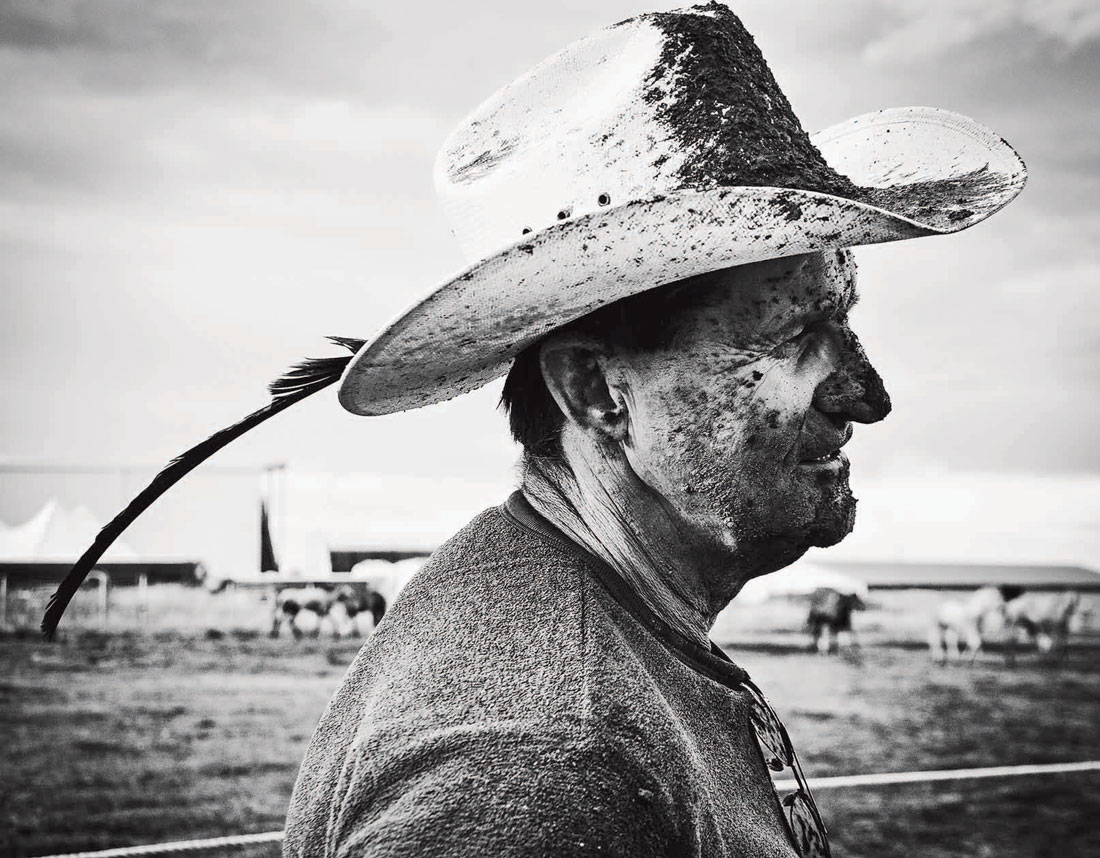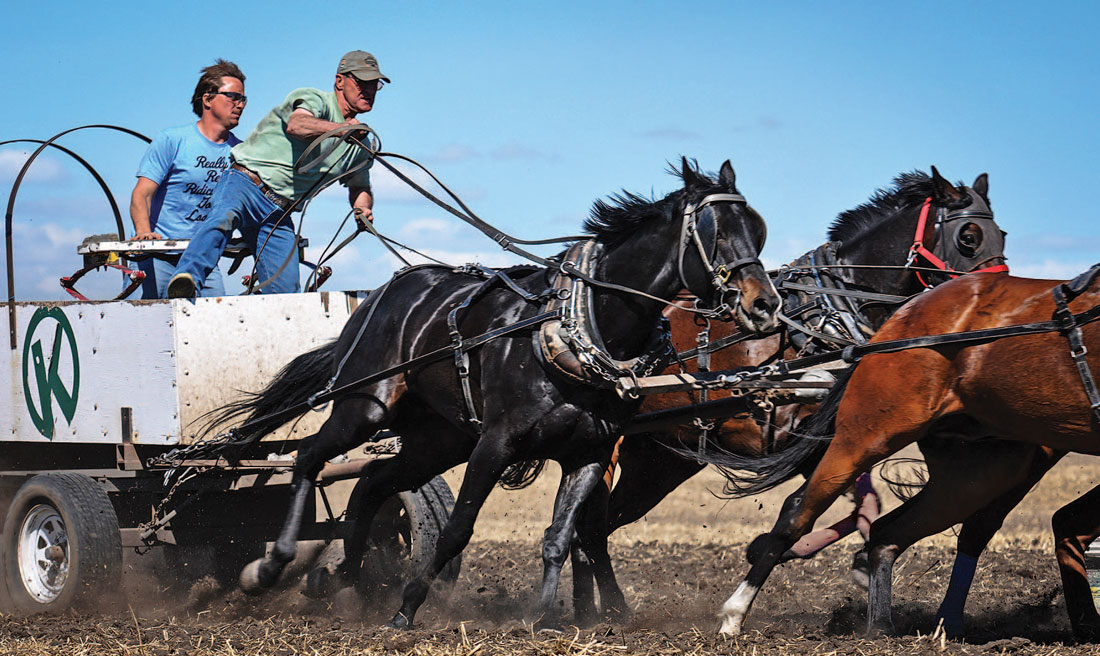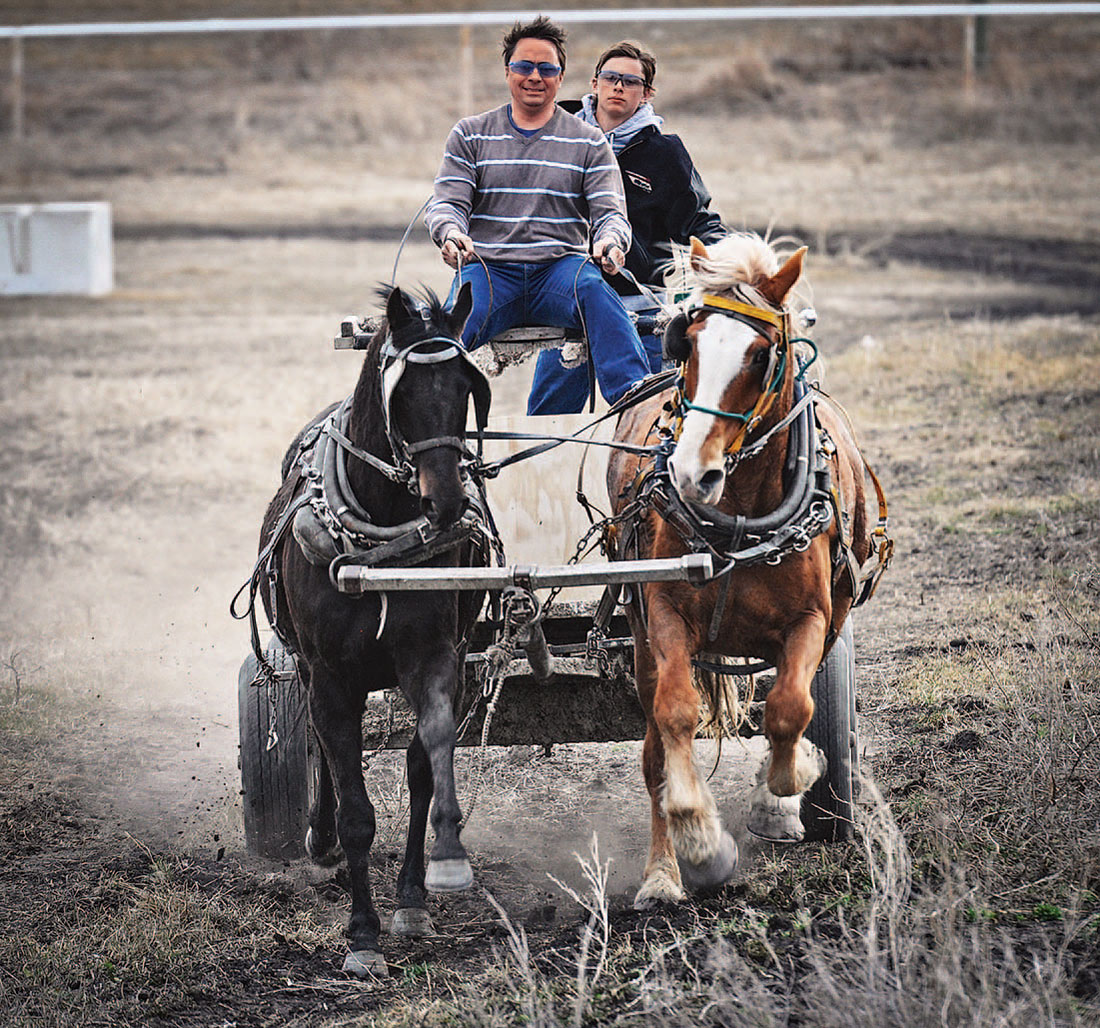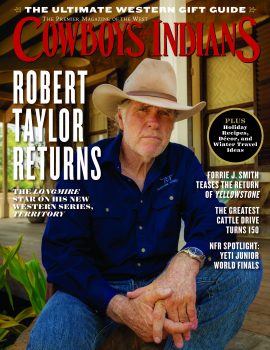The legendary patriarch of a Canadian chuck wagon racing family seeks one last crown.
Twelve-time champion chuck wagon racer Kelly “the King” Sutherland is confident his Calgary Stampede swan song will be a happy occasion.
“When I drive into the Calgary Stampede opening night, I just envision myself on the stage after 10 days of fighting furious competition,” he says. “No matter what comes, I know ultimately I’m going to be the last man standing.
“I think 13 is going to be a lucky number for me this year,” he says, laughing. “I was second a couple years ago, and I thought I could get it done then. ... I think if I can push it, I’ll get the job done this year.”
He’s got plenty of kin to push him along at Canada’s annual celebration of Western traditions and skills. The rest of the royal family of chuck wagon racing will be riding hair on fire at the Stampede, which runs July 7–16.
Kelly’s brother, 60-year-old Kirk Sutherland, is the defending Calgary Stampede Rangeland Derby champion, having beaten his own son, Mitch, 39, in the final heat last year. Kelly’s son, 46-year-old Mark Sutherland — who has finished just out of the top four the last two years at the Stampede — and Mark’s son, Dayton — who is just starting to make his mark in the sport — will be part of the competitive field as well.

The members of the royal court — the Sutherlands appreciate the sentiment but generally eschew such talk — are used to competing around each other, and all will be out to win. But they know 2017 is particularly special because it is the King’s last ride on his home turf. The 65-year-old Kelly, a 12-time Stampede GMC Rangeland Derby champion and six-time Calgary Stampede Aggregate winner, is retiring at the end of the 2017 season.
Although he’s spent this early spring morning in Grande Prairie, Alberta, trimming horses, doing some renovation on the family house, and shoeing some horses with grandson Dayton, he offers that, “I’m a cowboy; I got lots of time to talk.”
Kelly speaks slowly, with equal measures of straight-shooting confidence and deference to the natural gifts that have helped him win big in a demanding sport. He began racing in another era, without rider age restrictions. His first race was in Dawson Creek, a small northeastern British Columbia town. “I was 16, quite scared and full of emotions,” he says. “If you could drink a case of beer, no matter what age you were, and still kind of half-walk, you were a cowboy in those days.” Kelly had grown up “on the back of a racehorse,” as his father worked with them. Kelly became an outrider for a chuck wagon racer at 14, and before long he was training up to ride in the seat.

“I’ve trained hard for 50 years, but throughout that time I’ve watched people who have worked harder than I have, done other things to achieve the level I have, but they just didn’t have the communication skill with the horse that I do,” he says. “I’m humbled that for some reason the sport comes natural.”
During that time, he dominated his sport in unparalleled fashion, competing in a record 77 championship final heats (21 at the Calgary Stampede GMC Rangeland Derby alone), winning 25 of them. He has placed in the top 10 overall chuck wagon driver standings 41 times.
“This chuck wagon royalty started because they call Dad the King,” Mark Sutherland, who works in the oil and gas industry, says by phone as he pulls off the highway on the way to work. “He’s 65 years old, but if you are competing, he’s in the plan to beat. There are 36 competitors, but you don’t have to worry about beating 36 guys. You’ve got to worry about beating 10 guys, and he’s always in that 10.”
Chuck wagon races date back to the settling of the West. Cowboys would load up their stoves and tents, and race to the bar. The last one there had to buy the whiskey.
Modern chuck wagon races consist of two to four wagons, each pulled on a set course by a four-horse team of Thoroughbreds. The sport is most popular in the prairie provinces of Canada, where riders compete in two major racing circuits, the World Professional Chuckwagon Association and the Canadian Professional Chuckwagon Association, during warmer weather months. The WPCA submits 25 drivers and the CPCA submits 11 drivers to compete in the Calgary Stampede, which provides the biggest chuck wagon racing event and purse.
The 36 drivers are thinned out in heats during the run of the Stampede. Each race, coined a “half-mile of hell,” typically involves three or four teams and begins with two outriders per wagon who “break camp” by tossing two tent poles and a barrel representing the camp stove into the back of their wagon before mounting their horses and following the wagons. The wagon drivers complete a figure eight around two barrels and then circle a racetrack. Each outrider must finish within 150 feet of his or her wagon or they will be determined late. A wagon’s total time will be determined by adding its running time to any penalties it may have incurred during the course of the race.
All that leads to high drama. “The horses, all the dust and power, the start, coming down the home stretch, and the finish just look spectacular,” Mark says. “And, unfortunately, a wagon will tip over once in a while.”

Although Mark was running around playing outrider about as soon as he could walk, his most vivid early memory of his father racing occurred when he was 7 or 8 years old.
“Dad was turning a barrel, and the pole connecting the back and front wheels of his wagon broke. I remember realizing the wagon wasn’t all in one piece, and Dad just disappeared under the wagon. He was OK; the horses were fine. It was all spectacular. And [after the race] my dad was underneath the wagon trying to fix it, and I remember climbing under there with him to try to help.”
Although Mark has realized a measure of success in chuck wagon racing, he knows he is “not going to win 12 Calgary Stampede championships — nobody else will, unless there’s only eight drivers left competing.” Instead, his goal is to be among those 10 riders in each race that competitors have to plan for.
“What’s made Dad so special in the sport is that he opens that window every year or two,” Mark says. “He makes more with less. For the rest of us, who are normal in their skill, ability, and understanding of horses, we have to wait for superstar outfits [horse teams] to come along to win big.”
Mark has had extremely competitive years, and years that were tough, “without the horsepower and enough smarts to pull it together.” And although he makes jokes about it, he figures being a chuck wagon driver in Western Canada “is as good as being any basketball player or football player.” The family is active raising money for charitable causes in their region.
Kelly notes that the sport carries a heavy financial burden, but being able to work so long with family has been gratifying. “I never pushed him into the sport, but I was always very thankful to spend that time with Mark and, as a result, have a very close bond with my grandchildren as well,” he says.
“Most people quit this sport when they reach 50 or 55, because it’s very grueling on the body. I just have such a passion for the sport, I found the energy and the dedication to stay in. But I’m quite prepared to leave now.”
From the July 2017 issue.












